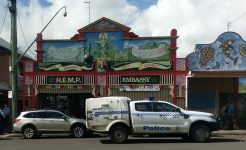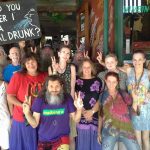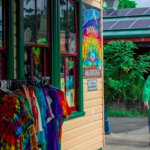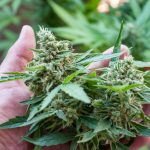Police Raid on Nimbin Hemp Embassy: Little More Than a Show of Strength

Stores in California will open at 2am AEST tomorrow morning. And some of the shoppers living in the fifth largest economy in the world will buy legal cannabis to smoke. Meanwhile, there will be other Californians at home, tending to the six cannabis plants they’re permitted to grow.
While on 3 May, in Canberra, politicians of all persuasions met to discuss the details of a piece of legislation designed to legalise the recreational use and personal possession of cannabis in the nation’s capital. It’s a bill that has a very strong chance of being passed sometime this year.
In the minds of many Australians, Nimbin is the epicentre of all things pot. Last weekend, the NSW town held the 27th annual MardiGrass, which is a festival calling for cannabis law reform. And with the recent global shift in attitude, this aim seems much more tangible than it initially did back in ’93.
So, it really beggars belief why NSW police would raid the Nimbin Hemp Embassy on the day prior the event. Strike Force Nerissa seized a reported 7.5 kilograms of cannabis leaf, along with around 500 pre-rolled joints.
And just to get it straight, the word is the authorities didn’t actually copy the records of 2,000 medicinal cannabis patients, and if the street value of what was seized was really $93,000 then that was some very pricey leaf officers got their hands on.
Under instructions
“It came out of nowhere. There were 30 or 40 police. They had a search warrant,” recalled embassy president Michael Balderstone. “They spent three or four hours. They went right through it. We had the volunteers here for MardiGrass. So, everyone had to file out passed the sniffer dogs.”
The veteran cannabis activist, who also heads the HEMP Party, said the seizure sounded greater than it was, as a lot of the pre-rolled joints were actually damiana, while, due to state laws, the weight of the entire batch of cookies that contained weed was recorded as cannabis.
Section 4 of the Drug Misuse and Trafficking Act 1985 (NSW) contains the “admixture provision”, which stipulates that the weight of a substance containing an illegal drug is what a person is charged with. This means the flour, butter and sugar in a hash cookie all counts as pot.
“The raid was clearly to put a bit of a mark on the protest,” Balderstone told Sydney Criminal Lawyers. “There was a lot of police over the weekend. The Public Order and Riot Squad was here. At night, there were virtually no cars on the roads, just those big public order cars driving around.”
Long-embattled
This is not the first time the authorities have cracked down on Nimbin’s cannabis culture. In 2014, the 9/11 raids were carried out, which involved officers and their drug detection dogs descending upon the Oasis Café and the Perceptio Bookshop.
And then there was the 2008 April Fool’s Day raid, that saw 50 police from across the state storm the Hemp Embassy and the Nimbin Museum. On that occasion, there were eight arrests and four kilograms of cannabis was seized.
But, according to Balderstone, over the last couple of years, things are getting worse. “It’s harder in Australia now for cannabis users than I can ever remember,” he lamented. “It’s pretty bloody ironic, when the rest of the world is waking up to it being a medicine.”
Part of the fabric
The Lane Boys, as they were known, were well-respected in the Nimbin community. They were a group of young men, who were recognised for keeping the heavier drugs out of the local scene. They also dealt organic cannabis in Rainbow Lane in the centre of town.
Strike Force Cuppa was an investigation Richmond Area Command launched in August 2015. It entailed installing a CCTV camera in a tree that monitored the goings on in Rainbow Lane during the first six months of 2016.
Then, on 28 June that year, local police executed six search warrants in Nimbin and Lismore. Eleven Lane Boys were arrested for cannabis supply on the day. And another 18 men were arrested in the region around the same time also on charges involving the prohibited plant.
The Lane Boys were found guilty on supply charges in 2017. And when they appeared in Lismore court for sentencing on 27 July that year, to the disbelief of many in the courtroom, Magistrate Alexander Mijovich sentenced seven of the young men to actual prison time.
And in the nine months following the sentencing hearing, cannabis arrests around the sleepy Northern Rivers town continued as part of ongoing sniffer dog operations. Indeed, seven people were arrested in relation to the herb just a week prior to last year’s MardiGrass demonstration.
Nothing to do with road safety
Balderstone is baffled as to why police raided the local institution the day before the event, as police are certainly aware that they’re not going to prevent locals from smoking weed. “Anyway, it didn’t daunt us at all for MardiGrass,” he affirmed. “We went on and had a great weekend.”
But, there’s one aspect of policing that’s impacting the community in a “massive” way. And that’s roadside drug testing, as the local region has long been targeted by the testing regime, which utilises a method that doesn’t test for driver impairment, but rather picks up minute traces of THC.
On a number of occasions, Lismore court found that people have tested positive for drug driving days after smoking a joint. And locals are dreading the new regime that takes effect on 20 May, which will see people lose their licence instantly following a positive lab result with no court appearance.
As it is, locals are too afraid to drive. And the roadside testing blitz has resulted in lower numbers at MardiGrass over the last couple of years. “We’re kind of in the middle of nowhere in Nimbin,” Balderstone explained, “so they can block every road.”
“It’s like one of those moats around a castle and you’ve got to get through the crocodiles to get here.”







